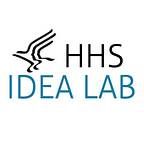The Invent Health Initiative: Invention and Innovation in Emergency Preparedness
By Susannah Fox
Dr. Nicole Lurie, Assistant Secretary for Preparedness and Response (ASPR), opened our Invent Health Town Hall at the end of January with a perspective on innovation that set the tone for the day:
“It is really a lot easier to get to ‘yes’ if you don’t have to go through ‘no’ first.”
The Invent Health initiative is designed to empower the small-scale inventors (the government employee, the nurse, the patient, the computer scientist, the engineer, the designer) by connecting them to resources and to communities that will guide them down avenues of “yes” as they navigate a path toward finding — and sharing — solutions to home health and clinical care challenges.
Watch Dr. Lurie in the video below as she shares her stories, experiences, and perspectives on health innovation in government.
But we also want to hear from you, the inventors and the makers, the builders and the dreamers, as we publish the second in our Invent Health blog series. Tell us a few things:
When has the word “yes” made a difference in how you pursued a project, an idea, or an invention designed to improve your health or someone else’s?
What opportunities exist to innovate in the health care space during emergency situations? What are some examples that you have seen?
Leave us your thoughts in the response section of this post! Not sure how? Read this.
And tune in below to view Dr. Nicole Lurie’s Invent Health Town Hall talk:
GUEST: Dr. Nicole Lurie, Assistant Secretary for Preparedness and Response (ASPR), U.S. Department of Health and Human Services (HHS)
HOST: HHS IDEA Lab
LOCATION: Invent Health Town Hall, Hubert H. Humphrey Building, Washington, D.C.
BELOW ARE SOME KEY POINTS AND RESOURCES FROM THE TALK:
[1:38] Dr. Nicole Lurie came to ASPR in 2009 and is a champion of innovation at HHS.
[1:54] “First thing I was pretty struck with going out to disasters is, as one public health officer said, ‘All of these people came out of the woodwork and we didn’t know they were there.’ Health departments in general have no idea who lives in their community.”
[3:36] “Fast forward to now, we have a system we just did it in Flint, where within a couple hours of request, CMS is a response agency, and it now makes available in real time, sets up a password protected Web site, has the names and addresses of everybody who’s got water-dependent durable medical equipment and people have gone and knocked on the doors of all of those people, like people who have dialysis and at home and people who have tube feeds, and made sure that they have safe water.”
Flint, Michigan Water Crisis (Wikipedia)
Centers for Medicare & Medicaid Services (CMS)
[4:59] “How do we make it so that your equipment sends a signal [in the event of an emergency]?”
[5:36] “We then learned that every device manufacturer has it’s own source code and so you can’t have a universal device. We had to solve that problem. We went out to NIST. National Institute of Standards and Technology. And we explained to them what the problem was, they got behind it. And they just voted on a data standard two weeks ago for durable medical equipment….By the end of the year we ought to have an international standard for how these devices transmit.”
[6:28] Dr. Lurie talks about the 2013 idea challenge for emergency response which was designed to help communities support patients who depend on durable medical equipment (DME), such as oxygen concentrators and portable ventilators, during emergencies. The challenge sought inventive ideas on how to create a system that, in emergencies, could signal the location and status of the life-sustaining equipment. With this information, patients and caregivers can prepare and respond to prevent low batteries in emergencies.
[6:52] “Two years after I sponsored this competition, I got a letter in the mail from a guy named David Li and he said, ‘Hi, my name is David Li, I’m a 16 year old student in Long Island and two years ago I entered your competition, and my dad had to open an account for me because I wasn’t 18, and I won $2,000. And I took that money and I bought a bunch of other equipment, and I set up a prototype device and I’ve tested it in my community, I have a patent pending, here’s my publication, I want to tell you about it.’”
We in the HHS IDEA Lab love this story and shared it with our colleagues at the Smithsonian who invited me to speak at the kick-off of their prize competition focused on young inventors. See: Kid Inventors Focus on Health (HHS IDEA Lab)
[8:00] My Preparedness Story: Staying Healthy & Resilient” Video Challenge (Challenge.gov)
[8:18] ASPR Blog: What would you do if you knew and HHS emPOWER Map (www.phe.gov)
